
ICAS Bulletin (online ISSN 2836-3418, print ISSN 2836-340X) is published every other week throughout the year at 1919 M St NW, Suite 310, Washington, DC 20036.
The online version of ICAS Bulletin can be found at chinaus-icas.org/bulletins/.
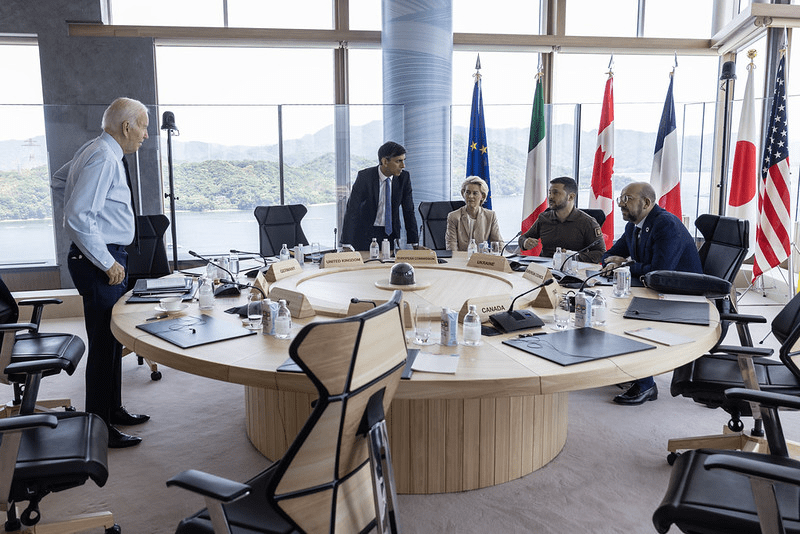
– China’s new ambassador to the U.S. Xie Feng has left China to fill the previous ambassador Qin Gang’s place in Washington, D.C.
– Russia and China retaliate against the G7’s increasing concern over their global threats, accusing the group of hindering international peace.
– At a 3-day G7 summit in Japan, G7 leaders challenged China’s “economic coercion,” highlighting their dependence yet disputes with Beijing on issues like trade, human rights and Taiwan, a stance ignited by China’s “weaponisation of economic vulnerabilities.”
– Following the 3-day G7 summit in Japan, President Biden hinted at an impending shift in U.S.-China relations, suggesting de-risking and diversifying economic engagement while maintaining open communication.
– G7 leaders agreed on a joint approach to ‘de-risk’ and diversify economic engagement with China rather than decoupling, echoing U.S. Treasury Secretary Janet Yellen’s previous statement.
– While on a visit to the United Kingdom, U.S. Republican Mike Gallagher warns the UK that China aims to dominate and humiliate the West, predicting possible conflict over Taiwan.
– As a G7 leaders summit was held in Japan, Xi Jinping hosted the inaugural China-Central Asia summit, seeking to strengthen partnerships and counter U.S. influence.
– The U.S. announced the new U.S.-Taiwan Trade Initiative which looks to stimulate trade between the U.S. and Taiwan by reducing trade restrictions. The initiative comes a few days before Chinese Commerce Minister Wang Wentao is expected to meet with the U.S. Trade Representative Katherine Tai.
– On May 16, Chinese Premier Li Qiang urged the Netherlands to maintain “strategic autonomy” and promoted cooperation across various sectors amid rising U.S.-China tensions impacting global supply chains and technology trade.
– U.S. National Security Adviser Jake Sullivan and Chinese official Wang Yi hold a meeting in Vienna, highlighting a strain in relations while trying to responsibly manage competition.
– Despite internal disagreements about the severity of measures, G7 nations plan to counter ‘economic coercion’ by China, signaling their intent to better coordinate responses to China’s economic practices.
– China dismissed the possibility of a meeting between its new Defense Minister Li Shangfu and U.S. Defense Secretary Lloyd Austin at a Singapore security forum due to ongoing sanctions.
Associated News References:
“Russia and China hit back at a G7 that saw them as a threat,” CNN News, May 22
“G7 takes stand against China’s “economic coercion,” BBC News, May 21
“Biden sees shift in ties with China ‘shortly’,” Reuters, May 21
“‘We are not decoupling’: G-7 leaders agree on approach to ‘de-risk’ from China,” CNBC News, May 21
“China wants to subordinate west, US politician claims on UK visit,” The Guardian, May 19
“As the U.S. Attends the G7, China Hosts a Summit of Its Own,” The New York Times, May 18 [Paywall]
“US, Taiwan Agree to Lift Trade, Clouding Planned China Talks,” Bloomberg, May 18 [Paywall]
“China calls on Netherlands to ‘adhere to strategic autonomy’, as US restrictions weigh on trade,” South China Morning Post, May 17 [Paywall]
“U.S. sanctions on China defense chief loom over chance for talks,” Nikkei Asia, May 12 [Paywall]
“U.S., China Senior Officials Meet in Tentative Effort to Restart Ties,” The Wall Street Journal, May 11 [Paywall]
“China the Target of New G-7 Push Against ‘Economic Coercion’,” Bloomberg, May 11 [Paywall]
“China pours cold water on bilateral meeting with US defence secretary,” Financial Times, May 10 [Paywall]
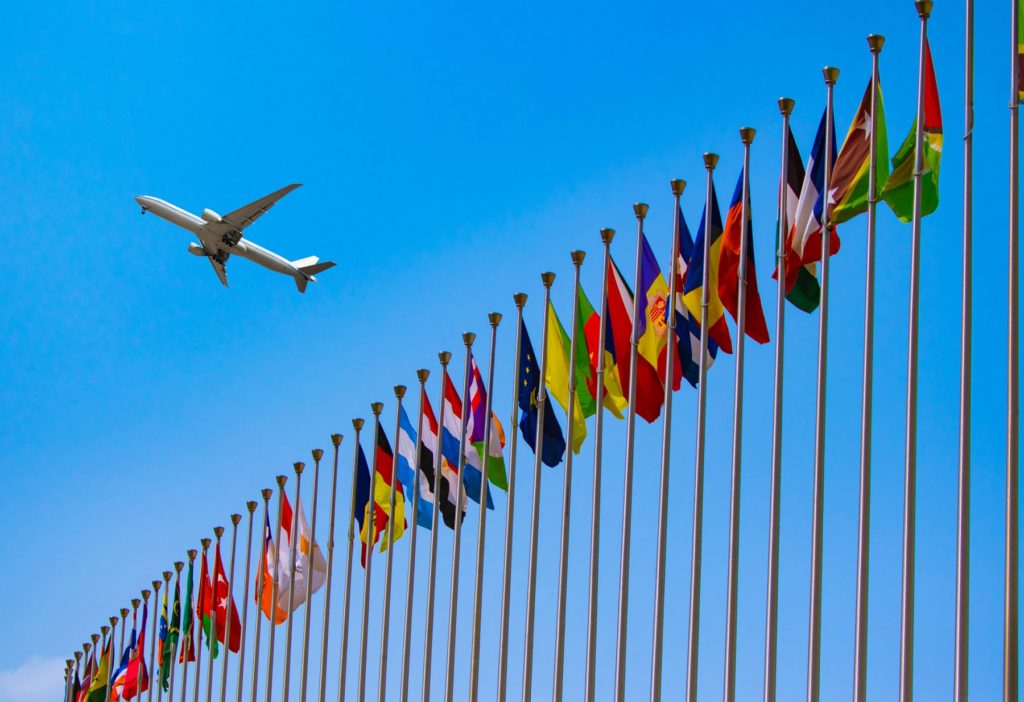
– The U.S. and Taiwan agreed on the initial part of their “21st Century Trade” initiative, emphasizing collaboration on “customs and border procedures, regulatory practices, and small business,” with further negotiations on complex trade areas expected.
– U.S. Republican Sen. Todd Young outlined upcoming legislation to bolster U.S. competitiveness against China’s economic coercion, anticipating a unified stand by G7 leaders on Beijing’s influence.
– UK Prime Minister Rishi Sunak indicated possible stricter export controls and investment restrictions on British firms in China, expressing alignment with U.S. policy toward Beijing ahead of the G7 summit in Japan.
– Top Biden administration aides have highlighted the risk of budget cuts to the U.S. competition with China, amidst intense negotiations in the U.S. Congress to raise the debt ceiling.
– U.S.-listed Chinese companies are switching to American and Singapore auditors to comply with U.S. accounting standards and reduce delisting risk under the Holding Foreign Companies Accountable Act (HFCAA).
– Ford Motor Co. plans to cut over 1,300 jobs in China as sales plummet due to the rising popularity of electric vehicles from Tesla and local companies.
– U.S. solar product manufacturers criticize Biden’s tax credits for being lax on China, arguing that the rules do not sufficiently encourage manufacturing relocation from China.
– U.S. consulting firm Bain & Company is offering China-based staff six months of voluntary leave following police investigations into the company’s Shanghai offices.
– The U.S. Department of Homeland Security raided the premises of Chinese solar panel maker Jinko Solar as part of an ongoing federal investigation.
– In a move to diversify grain sources, China received its first corn shipment from South Africa, following cancellations of U.S. corn orders, signifying Beijing’s focus on securing critical grains.
Associated News References:
“US, Taiwan reach deal on first part of ’21st Century’ trade pact,” Reuters, May 19
“China not ‘solely a military threat,’ U.S. senator warns,” Nikkei Asia, May 17 [Paywall]
“Sunak Says UK Aligned With US on China, Mulls Investment Curbs,” Bloomberg, May 17 [Paywall]
“US lawmakers, Biden aides invoke China competition in debt fight,” Reuters, May 16
“Chinese companies switch auditors to avoid U.S. delisting risk,” Nikkei Asia, May 16 [Paywall]
“Ford Seen Laying Off 1,300 Workers in China, Local Media Reports,” Bloomberg, May 15 [Paywall]
“Some U.S. Solar Makers Criticize Biden’s Tax Credits as Too Lax on China,” The New York Times, May 12 [Paywall]
“US consulting giant Bain & Company offers China staff 6 months of voluntary leave, sources say,” South China Morning Post, May 11 [Paywall]
“US conducts raids at two properties of China’s Jinko Solar,” Reuters, May 10
“China gets first corn shipment from South Africa, bolstering push to diversify away from US,” South China Morning Post, May 8 [Paywall]

– Papua New Guinea will allow U.S. troops to have access to the nation’s ports and airports, as a part of a larger initiative from the Biden administration to boost Pacific ties in-lieu of U.S.-China competition in the region.
– The Chinese ambassador to Australia urged against an AUKUS decision to allow for nuclear-powered submarines, claiming the plan was “unnecessary consumption of the hardworking Australian taxpayers’ money.”
– The People’s Liberation Army released a statement that China is prepared to “resolutely smash any form of Taiwan independence” amid a possible acceleration of the sale of U.S. defense weapons to Taiwan.
– The Philippine ambassador to the U.S. has said that the lack of U.S.-Chinese talks has caused him to believe “the world is in trouble.”
– The Chinese People’s Liberation Army filed a report stating that the United States “self-destroyed” their own floating sonars to prevent the device from falling into Chinese hands, after a close encounter between the two militaries in 2021.
– Analysts are claiming that the warming ties between Japan and South Korea will raise serious concerns in the Chinese government, explaining that it will affect the countries’ ability to have trilateral cooperation. The warming ties between South Korea and Japan are reportedly a result of increased U.S. presence in the region.
Associated News References:
“Chinese commerce minister to meet US counterpart in Washington next week,” CNN News, May 18
“US-China rivalry: American troops to access Papua New Guinea ports, airports in new security pact,” South China Morning Post, May 18 [Paywall]
“China’s ambassador to Australia says Aukus an ‘unnecessary’ use of taxpayer money and ‘not a good idea’,” The Guardian, May 18
“China says ready to ‘smash’ Taiwan self-rule as US prepares major arms package, sends advisers,” AP News, May 16
“Lack of U.S.-China talks puts world ‘in trouble’: Philippine envoy,” Nikkei Asia, May 15 [Paywall]
“PLA reveals US-China military encounter off Hong Kong day before January 6 Capitol riot,” South China Morning Post, May 15 [Paywall]
“Warming South Korea-Japan ties sends chill through China over potential US pivot, analysts say,” South China Morning Post, May 9 [Paywall]

– Amid security concerns, China urges discontinuation of Micron chips for sensitive computing applications, escalating a technology feud with the U.S.
– Montana becomes the first U.S. state to ban TikTok across the entire state, citing privacy concerns related to alleged Chinese intelligence gathering.
– U.S. technology advisory firm Forrester Research is closing its China office and laying off staff amid Beijing’s crackdown on foreign consultancies, coinciding with a tightening of national security scrutiny.
– Chinese brokerages Futu Holdings and Up Fintech to withdraw trading apps that allow overseas investments, complying with Beijing’s tightening controls.
– A lawsuit claims that the Chinese Communist Party had supreme access to U.S. data through TikTok parent company ByteDance.
– U.S. government probes Rockwell Automation over potential cybersecurity threats from its China operations that may expose U.S. infrastructure to cyberattacks.
– AI researchers debate future visions of AI at a conference in Rwanda amid concerns that U.S. and China dominance may leave other countries behind.
Associated News References:
“China tells tech manufacturers to stop using Micron chips, stepping up feud with United States,” AP News, May 21
“Montana to become first US state to ban TikTok,” Reuters, May 18
“US-based Forrester Research to close China office amid Beijing’s crackdown of foreign advisories,” South China Morning Post, May 18 [Paywall]
“Two Trading Apps That Allowed Chinese Citizens to Invest Overseas Get Pulled From China,” The Wall Street Journal, May 16 [Paywall]
“Ex-ByteDance exec claims CCP “maintained” access to U.S. data,” Axios, May 13
“Rockwell Automation faces U.S. government probe over China ops – WSJ,” Reuters, May 10
“AI Researchers Worry the U.S. and China Will Leave Everyone Else Behind,” The Wall Street Journal, May 8 [Paywall]

– China, prioritizing security overgrowth, appoints “spymaster” Chen Yixin to oversee crackdown on foreign firms, triggering a concern in global businesses.
– U.S. government announces first cases from newly formed technology espionage team, with arrests linked to Russia, China, and Iran.
– A Hong Kong leader said that China’s sentencing of a 78-year-old U.S. citizen for spying exposes national security threats and urges vigilance.
– U.S. charges a former Apple employee for allegedly stealing technology for China, highlighting the efforts of the recently established “strike force”.
– China has sentenced a 78-year-old U.S. citizen to life in prison on spying charges.
– An American man from Boston is charged with working alongside Chinese officials to monitor local pro-democracy activists, suggesting Chinese influence in U.S. politics.
Associated News References:
“China Puts Spymaster in Charge of U.S. Corporate Crackdown,” The Wall Street Journal, May 18 [Paywall]
“U.S. Tech Espionage Team Unveils First Cases Involving China and Russia,” The New York Times, May 16 [Paywall]
“Hong Kong leader says China’s sentencing of US citizen exposes national security threats,” AP News, May 16
“U.S. charges Apple ex-employee for trying to steal technology, fleeing to China,” Reuters, May 16
“China sentences 78-year-old US citizen to life in prison on spying charges,”AP News, May 15
“Boston man charged with providing Chinese officials information on pro-democracy activists,” AP News, May 12
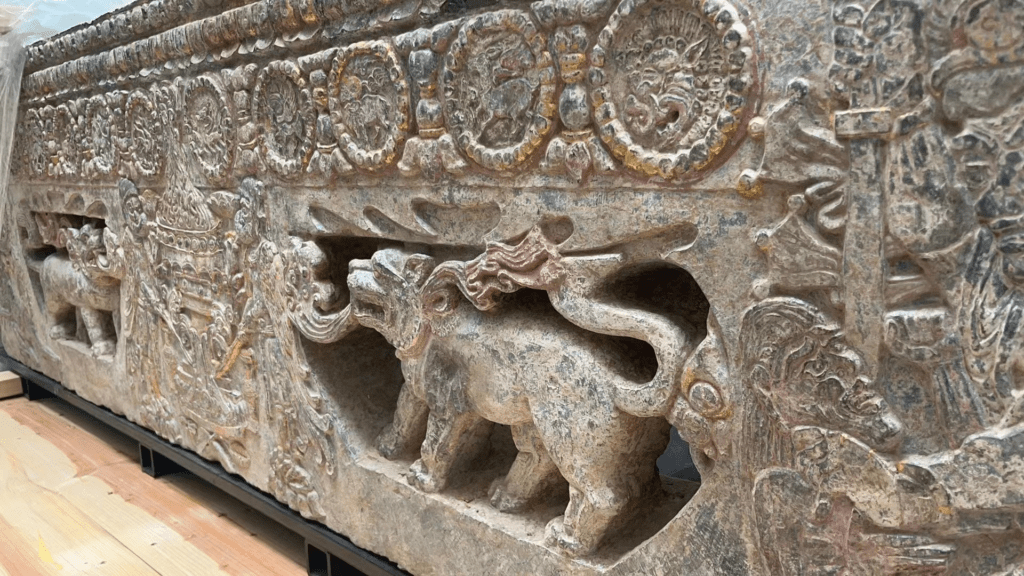
“Microsoft Works to Fix Problem With Skype Calls to China,” The Wall Street Journal, May 17 [Paywall]
“Lab monkey prices soar in U.S. after China cuts off exports,” Nikkei Asia, May 16 [Paywall]
“Founder Behind Mega China Bicycle Bust Starts Over in NYC,” Bloomberg, May 15 [Paywall]
“Former NBA star Howard stirs Chinese anger by calling Taiwan a country,” Reuters, May 12
“Blinken announces Deputy Secretary of State Wendy Sherman’s retirement,” CNN, May 12
“US Returns Two Stolen Relics Worth $3.5 Million to China,” Sixth Tone, May 11
May 23 hosted by Center for Strategic and International Studies
May 23 hosted by National Committee on U.S. China Relations
May 22 hosted by Center for Strategic and International Studies
May 22 hosted by Wilson Center
May 22 hosted by Wilson Center
May 16 hosted by Center for Strategic and International Studies
May 12 hosted by Center for Strategic and International Studies
May 12 hosted by Foreign Policy
May 11 hosted by Carnegie Endowment for International Peace
May 10 hosted by Peterson Institute for International Economics
The Belt and Road’s Impact on Partner States
May 24 hosted by Wilson Center
Asia-Pacific Transitions featuring Eric Harwit
May 24 hosted by Pew Research Center
How China Sees the World in 2023
May 24 hosted by University of Alberta China Institute
The U.S. Role in Indo-Pacific Security: A Conversation with Ely Ratner and Siddharth Mohandas
May 25 hosted by Center for Strategic and International Studies
What does the future hold for Taiwan?
May 25 hosted by Brookings
U.S.-Indo-Pacific Conference 2023
June 14 hosted by Center for Strategic and International Studies
A Fireside Discussion with U.S. Ambassador to China Nicholas Burns
June 16 hosted by Center for Strategic and International Studies
Inside the U.S.-China Tech War
June 20 hosted by Foreign Policy
Digital Trade and the Indo-Pacific Economic Framework (IPEF): New Rules, New Opportunities, New Challenges
Wednesday, May 10, 2023
On May 10, 2023, the Institute for China-America Studies (ICAS) hosted a virtual public event to discuss digital trade and cross-border data flows in the context of the ongoing Indo-Pacific Economic Framework (IPEF) negotiations. The event was titled “Digital Trade and the Indo-Pacific Economic Framework (IPEF): New Rules, New Opportunities, New Challenges.” The panelists were introduced by Dr. Hong Nong, Executive Director of ICAS, and the event was moderated by Mr. Sourabh Gupta, Head of ICAS’ Trade n’ Technology Program. The featured panelists were: Dr. Susan Aaronson, Research Professor and Director, Digital Trade and Data Governance Hub at the George Washington University; Mr. Zennon Kapron, Founder and Director of the consultancy Kapronasia; and Dr. Patrick Leblond, CN-Paul M. Tellier Chair on Business and Public Policy at the University of Ottawa.
The panelists were in broad concurrence that given the dynamism and fluidity of innovation, processes and practices in the digital sphere, there were more questions than answers with regard to locking down cross-border data flow rules in digital economy agreements…
By Sourabh Gupta.
May 11, 2023
Summary:
The proposed “guardrail” that Joe Biden and Xi Jinping sought to erect last fall in Bali failed to emerge in the bitter aftermath of a wayward Chinese surveillance balloon that overflew the United States and violated its sovereignty. Though Antony Blinken and Wang Yi met on the sidelines of the Munich Security Conference afterward, aspersions cast by each side against the other, including a series of disparaging Chinese government reports, fed the chill in ties. Taiwan President Tsai Ing-wen’s meeting with House Speaker Kevin McCarthy during the return leg of her US transit added to bilateral and cross-strait tensions and were met with Chinese sanctions. Issues pertaining to Taiwan, be it arms sales or a speculated Chinese invasion date of the island, remained contentious. The administration’s attempt to restart constructive economic reengagement with China, including via an important speech by US Treasury Secretary Janet Yellen, appears to have fallen on deaf ears in Beijing.
*This Brief is part of the newly-established ICAS U.S.-China L.E.A.D. Project and includes a detailed ‘Chronology of U.S.-China Relations (January-April 2023)’ which will be updated once every four months as part of the L.E.A.D. Project.*
Note: This article is extracted from Comparative Connections: A Triannual E-Journal of Bilateral Relations in the Indo-Pacific, Vol. 25, No. 1, May 2023.
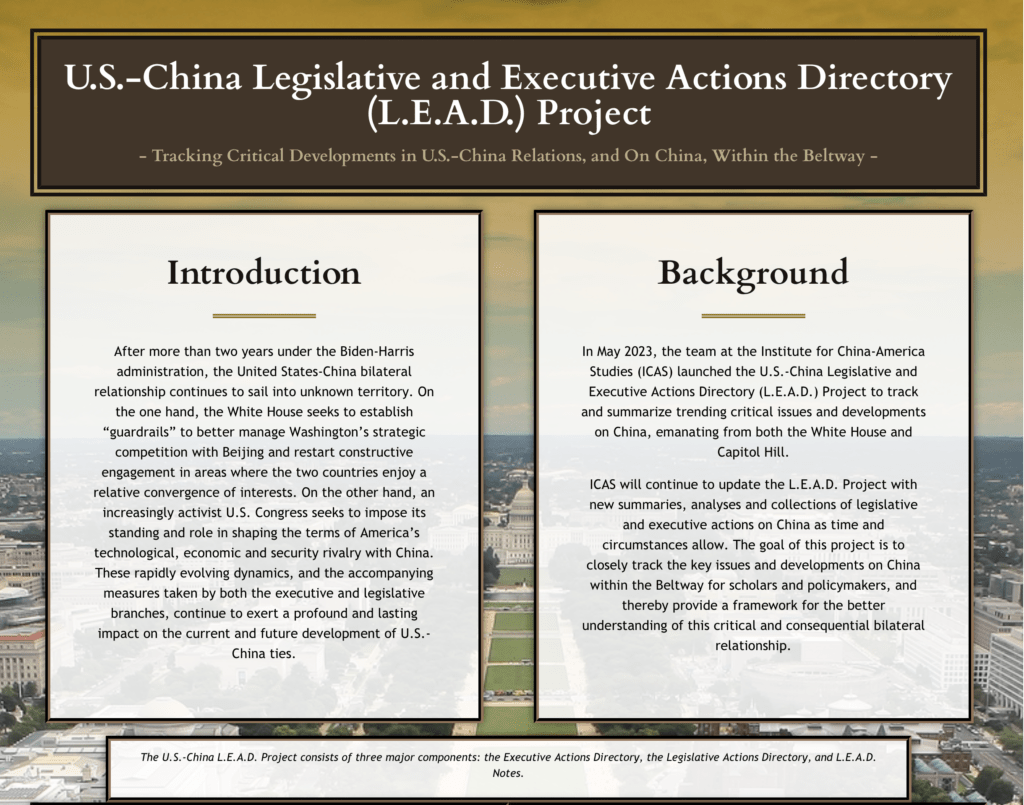

In May 2023, the Institute for China-America Studies (ICAS) launched the U.S.-China Legislative and Executive Actions Directory (L.E.A.D.) Project to track and summarize trending critical issues and developments on China, emanating from both the White House and Capitol Hill. ICAS will continue to update the L.E.A.D. Project with new summaries, analyses and collections of legislative and executive actions on China as time and circumstances allow.
The goal of this project is to closely track the key issues and developments on China within the Beltway for scholars and policymakers, and thereby provide a framework for the better understanding of this critical and consequential bilateral relationship.

Expert Voices Initiative Interview – André Aquino
May 25, 2023
Blue carbon, as a significant carbon sink and a natural defense line of coastal communities, plays an important role in mitigating climate change and preventing climate-related damages. However, many developing countries with rich blue carbon natural resources lack matching funds and technologies. Meanwhile, many countries with more advanced technologies and sufficient funds are inherently insufficient in the stock of blue carbon natural resources.
Thus, inspired by the “loss and damage” fund of COP27, the Institute for China-America Studies BCCC Program is holding an Expert Voice Initiative (EVI) interview to explore the possibilities for cooperation between developing and developed countries on blue carbon to protect, restore, develop, and utilize blue carbon resources.
This Expert Voices Initiative (EVI) interview, conducted virtually from the ICAS Office in Washington, D.C. on May 25, 2023 by Zhangchen Wang, will be released the first week of June 2023 on the ICAS YouTube page and website.
By Capt. Sukjoon Yoon, ret.
May 16, 2023
Ramifications of ROK President Yoon’s US Visit
South Korean President Yoon Suk-yeol is facing widespread and vigorous criticism following his state visit to the US on April 26 and his shuttle diplomacy attempts to normalize relations between the ROK and Japan, meeting Japanese Prime Minister Fumio Kishida in Tokyo on March 16, and again in Seoul on May 7. This criticism has not come from North Korea or China, as might be expected, but from domestic commentators concerned that Yoon is pivoting too much towards the US and is overly hasty in his approach to Japan.
The first issue is about nuclear strategy, for which President Yoon has recommitted to the Tailored Deterrence Strategy (TDS) proposed in the US Nuclear Posture Review of October 27, 2022. Some South Korean political factions would prefer the ROK to develop its own independent nuclear deterrent, and there is substantial public support for this…
On Saturday, May 20, 2023, Senior Fellow Sourabh Gupta was quoted by South China Morning Post on the G7’s approach on China.
On Monday, May 19, 2022, Senior Fellow Sourabh Gupta discussed the China-Central Asia summit in Xian on CGTN Europe’s Global Business.
On Friday, May 19, 2023, Senior Fellow Sourabh Gupta discussed the China-Central Asia summit in Xian on CGTN America’s The Heat.
On Wednesday, May 17, 2023, Senior Fellow Sourabh Gupta was quoted in the South China Morning Post on the effect of Biden’s cancellation Quad and Papua New Guinea visits.
On Thursday, May 11, 2023, Senior Fellow Sourabh Gupta was quoted in China Daily on the major U.S.-China and global policy speeches by U.S. leaders.

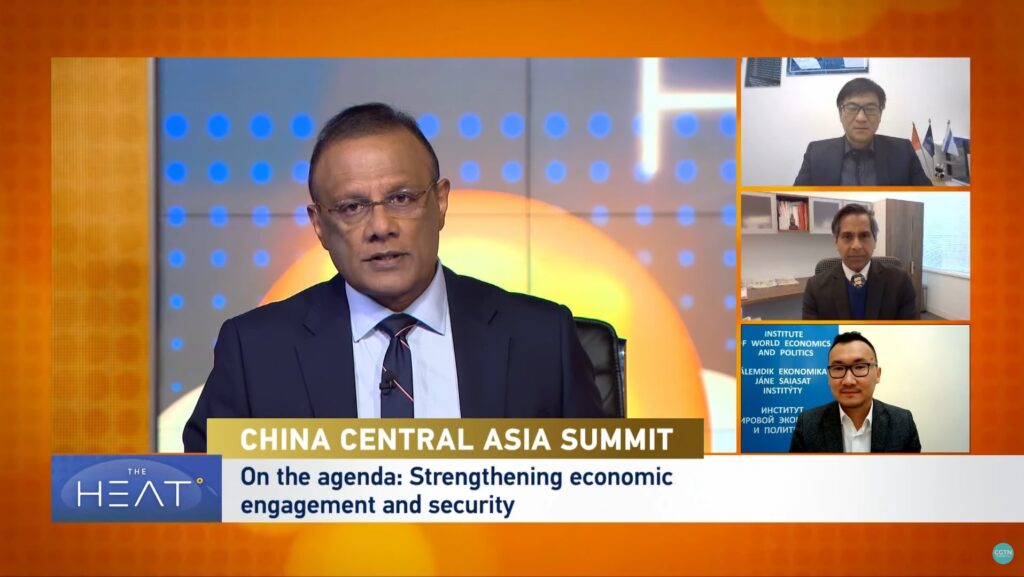

The Institute for China-America Studies is an independent nonprofit, nonpartisan research organization dedicated to strengthening the understanding of U.S.-China relations through expert analysis and practical policy solutions.
1919 M St. NW Suite 310,
Washington, DC 20036
icas@chinaus-icas.org
(202) 968-0595
© 2024 INSTITUTE FOR CHINA-AMERICA STUDIES. ALL RIGHTS RESERVED.